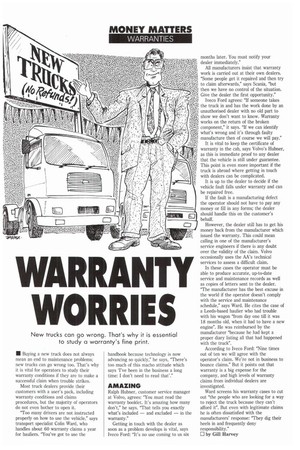WARRANTY WORRIE
Page 32

If you've noticed an error in this article please click here to report it so we can fix it.
New trucks can go wrong. That's why it is essential to study a warranty's fine print.
• Buying a new truck does not always mean an end to maintenance problems; new trucks can go wrong too. That's why it is vital for operators to study their warranty conditions if they are to make a successful claim when trouble strikes.
Most truck dealers provide their customers with a user's pack, including warranty conditions and claims procedures, but the majority of operators do not even bother to open it.
"Too many drivers are not instructed properly on how to use the vehicle," says transport specialist Colin Ward, who handles about 60 warranty claims a year for hauliers. "You've got to use the handbook because technology is now advancing so quickly," he says, "There's too much of this macho attitude which says 'I've been in the business a long time: I don't need to read that'."
AMAZING
Ralph Hubner, customer service manager at Volvo, agrees: "You must read the warranty booklet. It's amazing how many don't," he says. "That tells you exactly what's included — and excluded — in the warranty."
Getting in touch with the dealer as soon as a problem develops is vital, says Iveco Ford: "It's no use coming to us six months later. You must notify your dealer immediately."
All manufacturers insist that warranty work is carried out at their own dealers. "Some people get it repaired and then try to claim afterwards," says Scania, "but then we have no control of the situation. Give the dealer the first opportunity."
Iveco Ford agrees: if someone takes . the truck in and has the work done by an unauthorised dealer with no old part to show we don't want to know. Warranty works on the return of the broken component," it says. "If we can identify what's wrong and it's through faulty '; manufacture then of course we will pay."
It is vital to keep the certificate of warranty in the cab, says Volvo's Hubner, as this is immediate proof to any dealer that the vehicle is still under guarantee. This point is even more important if the truck is abroad where getting in touch with dealers can be complicated.
It is up to the dealer to decide if the vehicle fault falls under warranty and can be repaired free.
If the fault is a manufacturing defect the operator should not have to pay any money or fill in any forms; the dealer should handle this on the customer's behalf.
However, the dealer still has to get his money back from the manufacturer which issued the warranty. This could mean calling in one of the manufacturer's service engineers if there is any doubt over the validity of the claim. Volvo occasionally uses the AA's technical services to assess a difficult claim.
In these cases the operator must be able to produce accurate, up-to-date service and maintenance records as well as copies of letters sent to the dealer. "The manufacturer has the best excuse in the world if the operator doesn't comply with the service and maintenance schedule," says Ward. He cites the case of a Leeds-based haulier who had trouble with his wagon "from day one till it was 18 months old, when it had to have a new engine". He was reimbursed by the manufacturer 'because he had kept a proper diary listing all that had happened with the truck".
According to Iveco Ford: "Nine times out of ten we will agree with the operator's claim. We're not in business to bounce claims." But it points out that warranty is a big expense for the company, and high levels of warranty claims from individual dealers are investigated.
Ward screens his warranty cases to cut out "the people who are looking for a way to reject the truck because they can't afford it". But even with legitimate claims he is often dissatisfied with the manufacturers' response: "They dig their heels in and frequently deny responsibility."
by Gill Harvey




























































































